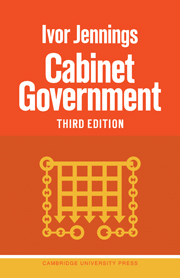Book contents
- Frontmatter
- Contents
- PREFACE
- CHAPTER I THE BRITISH CONSTITUTION
- CHAPTER II THE CHOICE OF A PRIME MINISTER
- CHAPTER III THE FORMATION OF A GOVERNMENT
- CHAPTER IV THE ADMINISTRATION
- CHAPTER V MINISTERS AT WORK
- CHAPTER VI INTER-DEPARTMENTAL RELATIONS
- CHAPTER VII TREASURY CONTROL
- CHAPTER VIII THE PRIME MINISTER
- CHAPTER IX THE CABINET
- CHAPTER X WAR AND DEFENCE
- CHAPTER XI ECONOMIC POLICY
- CHAPTER XII CONSTITUTIONAL MONARCHY
- CHAPTER XIII THE PERSONAL PREROGATIVES: DISMISSAL OF MINISTERS, DISSOLUTION OF PARLIAMENT, CREATION OF PEERS
- CHAPTER XIV PATRONAGE AND HONOURS
- CHAPTER XV GOVERNMENT AND PARLIAMENT
- APPENDIX I. GOVERNMENTS SINCE 1835
- APPENDIX II. EXAMPLES OF GOVERNMENTS
- APPENDIX III. THE PREROGATIVE OF DISSOLUTION
- APPENDIX IV. BIOGRAPHICAL AND BIBLIOGRAPHICAL NOTES
- INDEX
CHAPTER XI - ECONOMIC POLICY
Published online by Cambridge University Press: 23 September 2009
- Frontmatter
- Contents
- PREFACE
- CHAPTER I THE BRITISH CONSTITUTION
- CHAPTER II THE CHOICE OF A PRIME MINISTER
- CHAPTER III THE FORMATION OF A GOVERNMENT
- CHAPTER IV THE ADMINISTRATION
- CHAPTER V MINISTERS AT WORK
- CHAPTER VI INTER-DEPARTMENTAL RELATIONS
- CHAPTER VII TREASURY CONTROL
- CHAPTER VIII THE PRIME MINISTER
- CHAPTER IX THE CABINET
- CHAPTER X WAR AND DEFENCE
- CHAPTER XI ECONOMIC POLICY
- CHAPTER XII CONSTITUTIONAL MONARCHY
- CHAPTER XIII THE PERSONAL PREROGATIVES: DISMISSAL OF MINISTERS, DISSOLUTION OF PARLIAMENT, CREATION OF PEERS
- CHAPTER XIV PATRONAGE AND HONOURS
- CHAPTER XV GOVERNMENT AND PARLIAMENT
- APPENDIX I. GOVERNMENTS SINCE 1835
- APPENDIX II. EXAMPLES OF GOVERNMENTS
- APPENDIX III. THE PREROGATIVE OF DISSOLUTION
- APPENDIX IV. BIOGRAPHICAL AND BIBLIOGRAPHICAL NOTES
- INDEX
Summary
The co-ordination of economic policy has been a growing problem as the State has intervened more actively in economic affairs, and machinery has had to be devised to meet it. Until 1906 the economic problem was thought of primarily as a fiscal one and, since free trade was the policy adopted, the functions of the State were almost entirely regulatory except for the ‘gas and water socialism’ which developed in the second half of the nineteenth century through controlled or publicly owned monopolies, and except for the provisions of the poor laws, which had remained unchanged in principle since 1834. The Liberal Governments of 1906 to 1914 did not go much further, though they began to re-distribute income by increasing taxation and developing social services. Between the wars, however, unemployment became the major political problem, while the growth of the Labour party and world conditions generally focused attention upon economic problems and compelled Governments to intervene more actively in industry. The fiscal policy was changed in 1932, but it had already become a question of relatively minor importance, since tariffs are only one of the methods for controlling economic development.
The first effect of the changed attitude was an increase in the number of departments concerned with economic matters. In 1906 there were only the Treasury, the Board of Trade, the Board of Agriculture and Fisheries, the Local Government Board (in respect of the poor law), and the counterparts in Scotland and Ireland of the Board of Agriculture and Fisheries and the Local Government Board.
- Type
- Chapter
- Information
- Cabinet Government , pp. 317 - 327Publisher: Cambridge University PressPrint publication year: 1959



